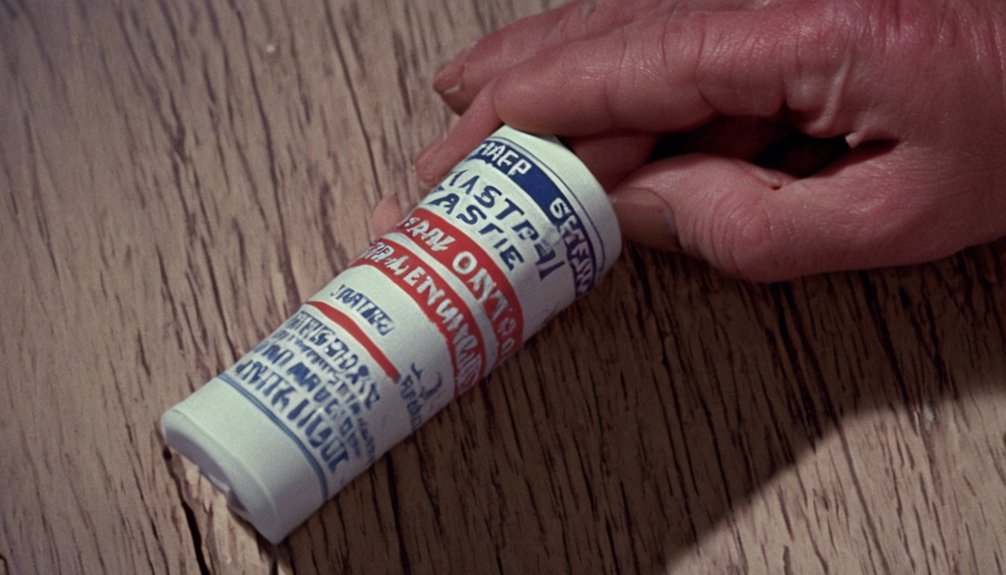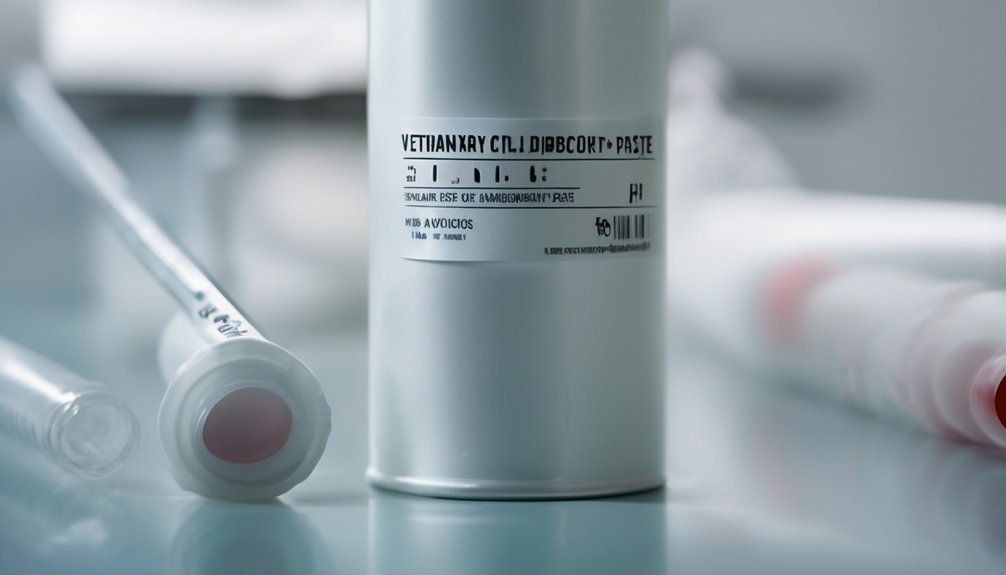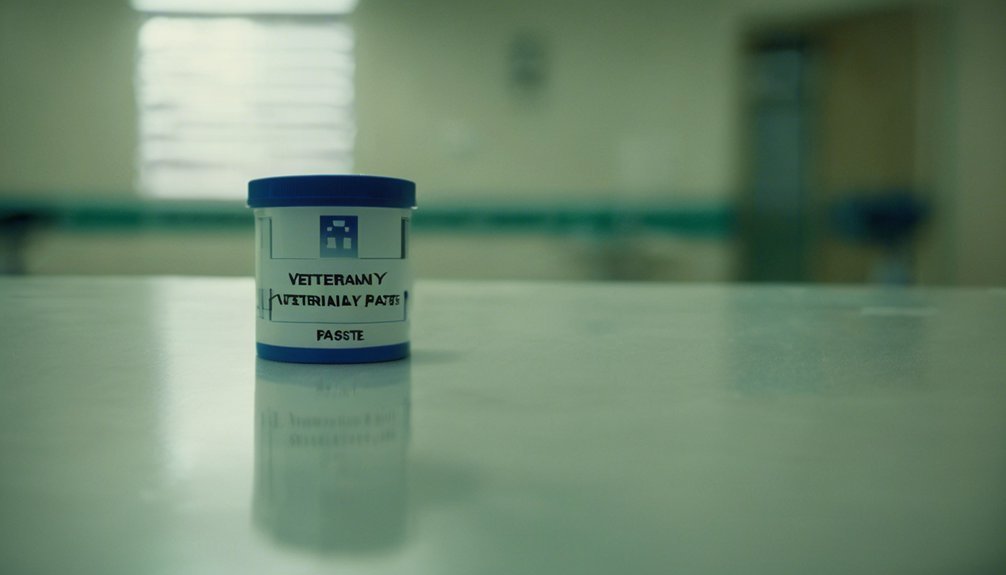Using veterinary paste for human cancer treatments is a dangerous gamble. The physiological differences between species can lead to severe adverse reactions that you might not anticipate. Ingredients that seem harmless in animals can be toxic to humans, and the lack of regulatory oversight raises significant concerns. As misinformation spreads, many are left wondering about the true risks. What happens when trusted medical practices are bypassed for unverified alternatives?
Key Takeaways
- Veterinary paste is formulated for animal physiology and may cause severe adverse reactions in humans due to metabolic differences.
- Active ingredients in veterinary products can lead to toxicity, allergic reactions, and dangerous drug interactions when ingested by humans.
- Lack of rigorous clinical trials for veterinary drugs in humans raises significant safety and efficacy concerns for cancer treatment.
- Legal regulations for veterinary medications do not ensure safety for human use, undermining established medical practices and patient safety.
- Misinformation about the effectiveness of veterinary treatments can lead to delayed medical care and worsen health outcomes for cancer patients.
Understanding Veterinary Paste and Its Intended Use

While veterinary paste is primarily designed for animal care, its unique formulations have drawn interest in human medicine, particularly for cancer treatments.
Understanding the veterinary paste composition is crucial; it typically includes active ingredients like antibiotics, anti-inflammatories, and antiseptics, tailored for animal health applications. These pastes are formulated to address specific health issues in animals, ensuring effective treatment without adverse effects.
However, the complexity of human biology means these same components may not translate safely or effectively for human use. It’s vital to recognize that veterinary products are rigorously tested for animals, not humans.
Therefore, pursuing alternative, clinically approved treatments for cancer is essential to ensure safety and efficacy while prioritizing patient well-being.
The Misconception of Safety: Animals vs. Humans
Many people mistakenly believe that because veterinary paste is effective for animals, it can be safely used in humans as well. However, the safety protocols designed for animal treatments don’t always translate to human health. The metabolic differences between species can lead to severe adverse reactions in humans.
| Aspect | Animals |
|---|---|
| Safety Standards | Rigorous testing for specific species |
| Dosage | Tailored to animal size and species |
| Side Effects | Different from human reactions |
Ignoring these disparities puts human health at risk. Relying on veterinary products without thorough research undermines established medical practices and can jeopardize patient safety. Always prioritize evidence-based treatments designed specifically for human use.
Common Ingredients in Veterinary Paste
Understanding the ingredients in veterinary paste can shed light on why these products aren’t interchangeable with human medications.
Common active ingredients often include antibiotics, anti-inflammatory agents, and hormones, tailored specifically for animal physiology. These compounds may not only differ in effectiveness for humans but also pose significant risks due to dosage variations.
Common active ingredients in veterinary paste, such as antibiotics and hormones, are specifically designed for animal physiology and can be hazardous for humans.
For instance, an ingredient that’s safe for a horse could be harmful in a human’s smaller system. Furthermore, the concentration of active ingredients in veterinary formulations is typically designed for larger animals, which means the dosage required for humans could lead to unintentional overdoses or inadequate treatment.
Thus, utilizing veterinary paste for human cancer treatments can jeopardize safety and efficacy.
Potential Risks of Ingesting Veterinary Products

Ingesting veterinary products poses significant health risks, especially when used outside their intended purpose. These products, designed for animals, often lack the rigorous safety testing required for human consumption, leading to potential human health risks.
| Risk Type | Description |
|---|---|
| Toxicity | Ingredients may be harmful or fatal to humans. |
| Allergic Reactions | Unforeseen allergies can cause severe reactions. |
| Drug Interactions | Veterinary medications can interfere with human drugs. |
It’s crucial to prioritize veterinary product safety to protect yourself and others. By raising awareness about these dangers, you can help prevent unnecessary harm and promote informed choices. Remember, what’s safe for animals isn’t always safe for humans.
Legal and Regulatory Issues Surrounding Veterinary Drugs
The safety concerns around ingesting veterinary products extend into the realm of legal and regulatory issues surrounding veterinary drugs.
Veterinary regulations are designed to ensure that medications are safe and effective for animal use, but they often lack the rigorous scrutiny applied to human drug approval processes. This disparity raises significant concerns when individuals consider using these substances for human conditions, such as cancer.
The absence of comprehensive clinical trials for veterinary drugs in human populations means that potential side effects and interactions remain largely unstudied.
The lack of thorough clinical trials for veterinary drugs in humans leaves potential risks and interactions largely unknown.
You must recognize that using veterinary medications for human treatment not only violates legal guidelines but can also jeopardize patient safety, undermining the very essence of serving others in healthcare.
Case Studies of Adverse Effects in Humans
Numerous documented cases illustrate the adverse effects humans have experienced after using veterinary drugs intended for animals.
Case reports reveal alarming instances of human toxicity, including severe allergic reactions and organ damage. For example, one individual developed acute kidney injury after ingesting a veterinary paste meant for livestock, leading to hospitalization and extensive medical treatment.
Another case involved gastrointestinal hemorrhaging linked to improper dosage of a veterinary drug, resulting in life-threatening complications.
These examples underscore the dangers of repurposing veterinary medications, which lack rigorous testing for human use.
It’s crucial to recognize that what may be safe for animals can pose significant risks to humans, emphasizing the need for safer, evidence-based treatment options in cancer care.
The Role of Traditional Medicine in Cancer Treatment

While the adverse effects of veterinary drugs highlight the risks of using unapproved treatments, many individuals turn to traditional medicine as a complementary approach in cancer care. Traditional therapies often focus on holistic approaches, addressing physical, emotional, and spiritual needs. You might find practices like acupuncture, herbal remedies, and mindfulness techniques beneficial alongside conventional treatments.
Here’s a summary of some traditional therapies:
| Therapy Type | Description |
|---|---|
| Acupuncture | Stimulates points to relieve pain and nausea |
| Herbal Remedies | Uses plant-based substances to support health |
| Meditation | Promotes relaxation and mental well-being |
| Nutritional Therapy | Focuses on diet to strengthen the immune system |
| Massage Therapy | Reduces stress and improves overall comfort |
Integrating these methods can enhance your treatment experience.
Alternative Natural Remedies: What Works?
How can alternative natural remedies support cancer treatment?
You might find that certain natural supplements and herbal remedies can complement conventional therapies. For instance, turmeric contains curcumin, which has shown promise in reducing inflammation and may enhance the effectiveness of chemotherapy.
Similarly, green tea extract is rich in antioxidants and may help protect healthy cells during treatment. Additionally, some studies suggest that omega-3 fatty acids, found in fish oil, may support overall health and improve patients’ quality of life.
However, always consult healthcare professionals before incorporating these remedies into your regimen. It’s essential to ensure that they don’t interfere with conventional treatment.
The Importance of Evidence-Based Medicine
Given the complexities of cancer treatment, relying on evidence-based medicine is crucial for ensuring effective patient care.
Evidence importance can’t be overstated; it provides a solid foundation for understanding which treatments work and why. When you prioritize medical integrity, you foster trust between patients and healthcare providers, enabling informed decisions based on rigorous research rather than anecdotal claims.
Utilizing evidence-based practices helps you avoid the pitfalls of unverified treatments, such as veterinary paste, which lack clinical validation for human use. By adhering to evidence-based medicine, you not only enhance treatment outcomes but also uphold a commitment to patient safety and well-being.
Ultimately, your dedication to evidence ensures that patients receive the best possible care tailored to their unique needs.
Psychological Factors: Why Some Turn to Veterinary Paste

Many individuals facing cancer feel desperate for solutions, particularly when conventional treatments seem inadequate or overwhelming. This psychological desperation can drive you to seek alternative solutions, often leading to risky choices like veterinary paste.
The allure of a quick fix, especially when battling a life-threatening illness, can cloud your judgment. You might believe that if something works for animals, it could work for you too. Unfortunately, this mindset overlooks the critical differences in human and animal physiology, leading to harmful consequences.
It’s essential to recognize that while your desire for effective treatment is valid, turning to unproven methods can jeopardize your health. Staying informed and seeking guidance from qualified healthcare professionals is crucial in navigating your treatment options responsibly.
How Misinformation Spreads in Health Communities
While you might seek out reliable information during your cancer journey, misinformation can easily infiltrate health communities. Misleading information often spreads through social media, forums, and even word of mouth, creating a breeding ground for health myths.
Individuals eager to help may unknowingly share unverified claims, propagating confusion and fear. This cycle is exacerbated by emotional vulnerability; when facing serious illness, you may gravitate toward miraculous solutions, dismissing evidence-based treatments.
It’s crucial to question the sources of information and consult healthcare professionals before adopting new therapies. By fostering a culture of critical thinking and evidence-based discussion, you can help combat the spread of misinformation, ensuring that you and others receive the best possible care in your health journeys.
The Consequences of Delayed Medical Treatment
Delaying medical treatment can have serious consequences that significantly impact your health and well-being. A delayed diagnosis can lead to the progression of diseases, making them harder to treat effectively.
For instance, cancer may spread beyond its initial site, reducing the effectiveness of available treatment alternatives and increasing potential complications. This can result in a poorer prognosis and a lower quality of life.
Moreover, the longer you wait for professional intervention, the fewer options you may have, limiting your ability to make informed decisions about your care.
Seeking Professional Help: Finding the Right Care

How do you ensure you’re receiving the best possible care for your health needs? Start by seeking professionals who specialize in integrative therapies, combining conventional treatments with holistic approaches tailored to your unique situation.
Research their credentials and experience in managing cancer effectively. Don’t hesitate to ask questions and express concerns; this fosters open communication and trust.
Engage in patient advocacy by actively participating in your treatment decisions. Look for healthcare providers who prioritize your well-being and listen to your preferences.
Support groups can also be invaluable, connecting you with others who share similar experiences. By surrounding yourself with knowledgeable professionals and a supportive community, you’ll enhance your chances of receiving optimal care and achieving better health outcomes.
Frequently Asked Questions
Can Veterinary Paste Actually Cure Cancer in Humans?
Veterinary paste isn’t a proven cure for cancer in humans. You should be cautious of cancer treatment misconceptions; using such products carries significant risks and could compromise your health. Always consult medical professionals for safe options.
Are There Specific Types of Cancer That People Misuse Veterinary Paste For?
You might envision desperate patients chasing myths of miracle cures. Misconceptions about efficacy lead some to misuse veterinary paste, often targeting common cancers like skin or breast. The risks of misuse can be dangerously high, overshadowing hope.
How Do Veterinary Drugs Differ From Human Medications?
Veterinary drugs often differ from human medications in their formulations and drug regulations. You’ll find variations in dosage, ingredients, and testing protocols, which can impact safety and effectiveness when considering treatment options for different species.
What Should I Do if I Accidentally Ingest Veterinary Paste?
If you accidentally ingest veterinary paste, seek emergency response immediately. Explain the situation to healthcare professionals, as it may pose serious health risks. Prompt action can mitigate potential complications and ensure your safety.
Are There Any Safe Veterinary Products for Humans?
You shouldn’t use veterinary products without consulting a professional. While some may seem like safe alternatives, veterinary ethics prioritize animal health, not human needs. Always seek evidence-based treatments tailored to human conditions for safety.
Conclusion
Choosing veterinary paste over established human treatments might seem like a shortcut to relief, but it poses significant risks that could jeopardize your health. While the allure of quick fixes is tempting, the potential for severe adverse reactions is a stark reality. Don’t let misinformation lead you down a dangerous path; prioritize your well-being by seeking evidence-based care. Trusting professionals ensures you’re not just treating symptoms but actively working towards a safer, more effective healing journey.




